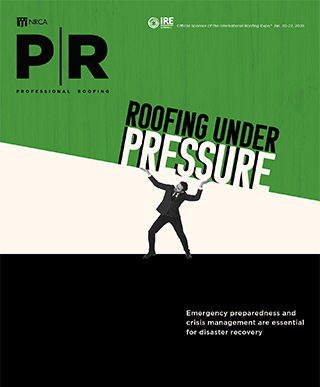There is broad agreement the roofing industry faces more challenges from government intrusion now than in the recent past. Given the growing effects of government policies on businesses, the results of the Nov. 6 elections could prove crucial to the industry's future.
Indeed, this may be the most important election during the past generation not only for the roofing industry but also for the nation. The federal government's budgetary challenges are more intractable than at any time since World War II, and one of the few areas of agreement in otherwise gridlocked Washington, D.C., is the need to curb the growing national debt. At nearly $16 trillion and roughly 100 percent of the U.S. annual gross domestic product, the debt must be addressed before it results in a serious fiscal and economic crisis. But that's where the agreement ends.
The contrast of visions between the presidential candidates about how to address the nation's fiscal and economic challenges is more striking than in any election since at least 1980, when Ronald Reagan defeated President Jimmy Carter.
President Barack Obama believes greater regulation of economic activity, increased government spending and higher taxes as a percentage of the U.S. economy are the answers to the malaise that grips the economy. If the president is re-elected, we can expect to see more legislative and regulatory initiatives, such as the ambitious 2010 health care law, proposed in his second term.
Former Gov. Mitt Romney (R-Mass.), in contrast, is calling for restraining government regulation, lower taxes and less public spending. Romney favors more investment in the private sector and greater flexibility for employers as the key to getting the economy back on track and addressing the government's serious fiscal challenges.
The race for the White House, now reaching its final month, presents voters with a fundamental choice that will profoundly affect the nation's future.
Outlook
As the major political parties concluded their conventions and formally announced their presidential nominees, indications are the race for the White House could go either way. Public opinion polling nationally and in key swing states indicates Obama has a slight lead over Romney. For example, a mid-August Gallup poll had the candidates in a statistical tie, with Obama at 47 percent and Romney at 46 percent.
Obama's small lead is a bit surprising by conventional measures of presidential politics. This should be a challenger's year given the economy's lackluster performance and high unemployment rate. No incumbent since Franklin Roosevelt in 1936 has won a re-election with unemployment as high as the 8.3 percent recorded in July.
If the election is a referendum on the incumbent's stewardship of the economy, Obama may have an uphill battle given the dismal economic numbers. However, if voters view the election as primarily a choice between the president as a self-described middle-class defender and Romney, whom the president's campaign is portraying as a latter-day robber baron, the president's chances for re-election improve dramatically. Additionally, the salience of social issues and foreign affairs could be important determinants of the outcome.
Romney's primary strategy is to keep voters focused on Obama's record on the economy. Additionally, Romney must convince voters he is capable of implementing policies that will strengthen the economy and create jobs. Romney has come under fire from some in his own party for failing to define himself positively since he emerged as the de facto nominee.
Although Obama may have a small lead heading into the fall, keep in mind late-deciding independent voters tend to break for the challenger. Also, Romney is a prolific fundraiser, and the Romney campaign outraised Obama's efforts in June and July, a sign Romney is gaining momentum.
The final outcome likely will be determined by the side that does a better job of getting its core supporters to the polls on Election Day.
Many policy issues on which the election will be fought are highly relevant to the roofing industry. The outcome of the presidential election, as well as the battle for Congress, will have significant consequences for the industry in the years ahead.
Tax issues
One of the most hotly debated campaign issues is whether to address annual budget shortfalls primarily through reducing spending or raising taxes. This is important for the roofing industry because businesses are the main target for obtaining more tax revenue.
With the Bush-era tax rates set to expire at the end of 2012, Obama believes existing rates should be extended only for those earning less than $200,000 ($250,000 for couples) per year. Under the president's plan, the top two tax brackets would increase from 33 to 36 percent and from 35 to 39.6 percent. Capital gains taxes would increase from 15 to 20 percent and taxes on dividends from 15 percent to the top individual rate. These tax increases would affect many small- and midsized business owners who pay taxes at the individual rates. Also, the estate tax on family-owned businesses would increase from 35 to 55 percent, with the exemption declining from $5 million to $1 million.
Romney proposes lowering income tax rates for all Americans through comprehensive reform that simplifies the tax code. Under Romney's plan, the top income tax rate, as well as the corporate tax rate, would fall from 35 to 28 percent and the lowest rate would fall from 10 to 8 percent. Capital gains and dividend rates would remain at 15 percent, and the estate tax would be eliminated. To avoid increasing the deficit, most existing tax credits and deductions now used by individuals and businesses to lower their tax liability would be eliminated.
Romney's comprehensive tax reform plan is designed to jump-start economic growth by providing greater incentives for investing in the private sector. Obama also has indicated a willingness to support some form of comprehensive tax reform that lowers some rates but not without increasing taxes on high-earning individuals and many small- and midsized businesses.
The election's outcome will determine whether taxes on many businesses increase in 2013 and beyond. In addition to the tax increases Obama proposes, several new taxes on investment income authorized in the 2010 health care law will take effect beginning in 2013, raising taxes for some businesses even further. Moreover, the income that would be derived from Obama's proposed tax increases is not sufficient to close the current budget gap. Without serious reform to entitlement spending, taxes likely will have to be increased even further.
Regulatory reform
Another major theme in the campaign is the level of business regulation by federal agencies. Given the veritable avalanche of regulations that are increasingly affecting the roofing industry daily, much is at stake Nov. 6.
The Obama administration has been aggressive with advancing new regulatory initiatives on numerous fronts. Probably the most problematic regulation for roofing contractors involves the Occupational Safety and Health Administration (OSHA). In 2010, OSHA made unilateral changes to steep-slope fall-protection regulations despite NRCA's vehement objections. The changes essentially eliminated the use of slide guards as a fall-protection option, which has increased risks to workers in some situations rather than improving workplace safety. NRCA is working with OSHA to address contractor concerns, but agency officials have been reluctant to move forward with specific modifications.
OSHA also has been developing several new regulations that could have major effects on the roofing industry, including its Injury and Illness Prevention Programs and an effort to tighten regulation of silica exposure in the workplace. There is speculation these regulations have been put on hold for political reasons in advance of the election. But it is widely expected OSHA will be even more aggressive with new and potentially burdensome regulatory initiatives during the next four years if Obama is re-elected.
Given the regulatory challenges faced by the roofing industry with OSHA and other federal agencies, NRCA has been working to advance several bipartisan regulatory reform initiatives in Congress. These bills would strengthen protections for businesses against intrusive regulations by providing for more public input and transparency in the agency development process.
The House approved several regulatory reform bills in 2011 with significant bipartisan support, but the bills were opposed by the Obama administration. Romney has indicated concerns with excessive regulations during the campaign and would appear to be more receptive to working with NRCA and other business groups regarding regulatory reform legislation in 2013.
Health care
Obama's Affordable Care Act (ACA), scheduled to become fully effective in 2014, is another major campaign issue. Whether the ACA is implemented as scheduled will have widespread effects on the entire U.S. economy, including the roofing industry.
If Obama is re-elected, most of the health care law is likely to be implemented as designed. Full implementation of the ACA fundamentally will change our health care system and how most employers offer health care benefits to employees.
Romney has pledged to repeal parts of the ACA, and if Republicans hold their majority in the House and gain control of the Senate, Romney may be able to deliver on much if not all of this pledge. Romney also has pledged to replace the ACA with market-oriented health care reforms designed to control costs and expand coverage.
Labor issues
Since failing to enact "card check" legislation designed to make union organizing easier when Democrats controlled Congress in 2009-10, the Obama administration has advanced several new regulations designed to achieve this goal. NRCA has opposed these initiatives because they place new burdens on employers or are designed to restrict their ability to respond to union organizing campaigns.
These initiatives include a regulation requiring employers to post a notice of employee rights in the workplace, as well as a rule designed to greatly accelerate the time frame under which a union election would be held. The National Labor Relations Board advanced these regulations despite strong opposition from NRCA and hundreds of other business groups. Earlier this year, NRCA and the Coalition for a Democratic Workplace were successful with pursuing litigation that has temporarily blocked these regulations from being implemented.
Obama has indicated his administration's efforts to facilitate union organizing are part of his plan to protect "middle-class workers." As such, more initiatives of this nature are likely in a second Obama term. Romney has criticized Obama's labor regulations as harmful to economic growth and job creation, and a Romney administration likely will not pursue an activist agenda with respect to labor issues.
Immigration reform
Immigration reform has played a small but significant role in the presidential campaign. Obama indicated in 2008 that immigration reform would be one of his top priorities during his first year in office, but he didn't follow through on this pledge even with strong Democratic majorities in Congress. However, this summer the president issued an Executive Order stating children brought to this country by illegal immigrants would not be deported under certain circumstances. This initiative should have the benefit of helping the president garner more support and enthusiasm among Hispanic voters, an increasingly important demographic group in several battleground states.
After taking a hard line on immigration during the Republican primary, Romney is not making this issue a focus of his campaign. He criticized the unilateralism of Obama's Executive Order but has not put forward specific proposals of his own.
Despite persistently high unemployment and a poor economy, many NRCA members continue to experience significant problems with finding good workers. As such, immigration reform that provides access to a reliable supply of labor likely will continue to be a priority for NRCA in the years ahead, especially if the economy improves.
In general, a second Obama term may be more receptive to dealing with immigration reform; Romney will likely choose to focus on other issues during his first term. However, the Obama administration appears to be against the idea of a workable guest-worker program for businesses, a vital component of any immigration reform effort for the construction industry.
As such, the outlook for progress on immigration reform that is beneficial to roofing contractors appears problematic no matter who holds federal office in 2013.
Congressional elections
During the past six years, we saw three "wave" elections in a row, which is highly unusual. In 2006, Democrats took back a majority in Congress for the first time in 12 years and then expanded their majority with Obama's help in 2008. Only two years later, Republicans stormed back and gained a net 63 seats to regain control of the House, the largest electoral gain since the 1930s.
It is unlikely we will see a fourth consecutive wave election in 2012. Instead, it appears Republicans will retain their House majority, with either a small net gain or loss of seats, unless something dramatic happens to change the dynamics this fall.
The real battle for control of Congress is in the Senate, where Democrats currently have 53 seats to 47 for Republicans. This year, Democrats must defend 23 seats and Republicans must defend only 10 seats, putting the former at a significant disadvantage. Additionally, conservative and business groups supportive of Republicans are spending more heavily than in past elections, and this levels the playing field against union political spending, which strongly favors Democrats.
Control of the Senate in Congress in 2013 largely will be determined in 10 or 11 key races. Of these, only two Republican senators face a serious challenge, while Republican candidates are mounting aggressive challenges to Democratic-held seats. If Republicans net a four-seat gain, they will take majority control of the Senate in 2013.
Heading into the fall, at least half a dozen of these races are considered "toss-ups" by political experts, which means future control of the Senate could go either way in November. NRCA, through ROOFPAC—NRCA's political action committee—is actively supporting pro-business candidates in numerous Senate and House races.
Republican control of the House and Senate would put Republicans in a commanding position on Capitol Hill in 2013. In this situation, Republicans may be able to do serious damage to the ACA and enact much of their tax agenda.
However, it still will be necessary to get 60 votes to pass most legislation in the Senate, and there is virtually no chance either party can win enough seats to reach this threshold. As such, bipartisan cooperation still is going to be necessary to address major policy challenges, no matter who resides at 1600 Pennsylvania Ave.
Making history
In 2009, only three days after taking office, Obama told several Republican congressional leaders: "Elections have consequences, and at the end of the day, I won."
The outcome of the 2012 elections is likely to have far-reaching, even pivotal, consequences for the nation and roofing industry. Whoever wins the presidential race will attempt to take the nation in a fundamentally different direction than that proposed by his opponent. This could be a truly historic election.
Duane L. Musser is NRCA's vice president of government relations.



